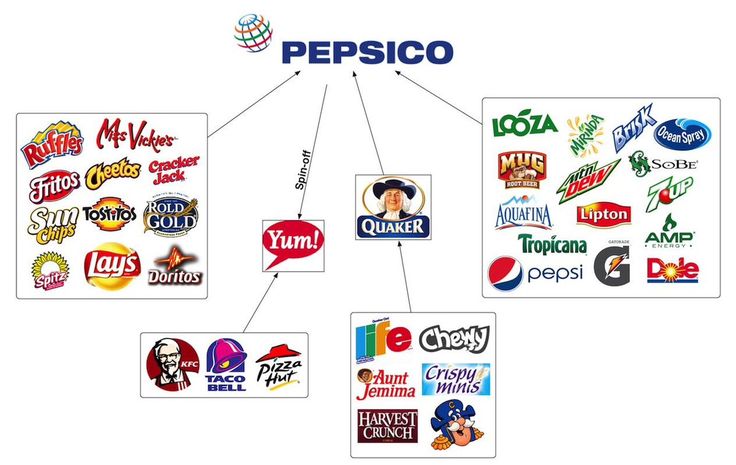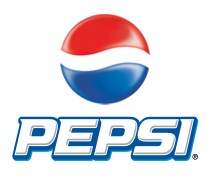PepsiCo is a multinational food and beverage corporation with a diverse portfolio of brands that are organized into a brand architecture. A brand architecture is a strategic framework that organizes and structures a company’s portfolio of brands to optimize brand awareness, differentiation, and customer loyalty. In PepsiCo’s brand architecture, there are three levels of brands: corporate, product, and endorsed brands.

Corporate Brands
At the top level of PepsiCo’s brand architecture, the corporate brand represents the overall company identity. The PepsiCo logo is the most recognizable symbol of the company and is used on all communication materials, including advertising, packaging, and sponsorships. The logo features a circular red, white, and blue design with a wavy line running through it. The wavy line is meant to represent the earth’s magnetic field and symbolizes PepsiCo’s commitment to sustainability. The logo is widely recognized globally and is associated with the company’s core values of innovation, diversity, and sustainability.

The PepsiCo corporate brand helps the company to establish a cohesive brand identity across its diverse portfolio of products. By using a consistent corporate brand across all communication materials, the company can reinforce its values and enhance brand recognition.
Product Brands
PepsiCo has a wide range of product brands in different categories, including beverages, snacks, and nutrition. Some of the most prominent product brands of PepsiCo are:
Beverages: PepsiCo is one of the largest beverage companies in the world and has a portfolio of beverage brands that includes carbonated soft drinks, juices, sports drinks, and tea. Some of the most well-known beverage product brands of PepsiCo include:
- Pepsi: Pepsi is PepsiCo’s flagship carbonated soft drink and one of the most recognizable brands in the world. Pepsi’s brand identity is centered around fun, excitement, and youthful energy, and it is marketed as a refreshing and energizing drink.
- Mountain Dew: Mountain Dew is another popular carbonated soft drink brand of PepsiCo, with a brand identity centered around extreme sports, adventure, and excitement. Mountain Dew is marketed as a high-energy drink that appeals to young and active consumers.
- Gatorade: Gatorade is PepsiCo’s sports drink brand, marketed to athletes and active individuals. Gatorade’s brand identity is centered around hydration, endurance, and performance, and it is available in different flavors and formulations to meet different hydration needs.
- Tropicana: Tropicana is PepsiCo’s juice brand, offering a variety of juices made from fresh fruits. Tropicana’s brand identity is centered around health, wellness, and freshness, and it is marketed as a premium juice brand.
Snacks: PepsiCo also has a strong presence in the snack category, with a range of product brands that includes chips, crackers, nuts, and popcorn. Some of the most popular snack product brands of PepsiCo include:
- Lay’s: Lay’s is one of the most popular potato chip brands in the world, with a brand identity centered around simplicity and enjoyment. Lay’s chips are available in a wide range of flavors, and the brand uses celebrity endorsements and social media marketing to promote its products.
- Doritos: Doritos is another popular snack brand of PepsiCo, with a brand identity centered around bold flavors and playful fun. Doritos chips are available in a variety of flavors and shapes, and the brand uses experiential marketing and social media campaigns to engage with its audience.
- Cheetos: Cheetos is a cheese-flavored snack brand of PepsiCo, with a brand identity centered around cheesy goodness and finger-licking fun. Cheetos snacks are available in different flavors and shapes, and the brand uses playful marketing campaigns to appeal to its target audience.
Nutrition: In recent years, PepsiCo has expanded its product portfolio to include a range of nutrition product brands, including breakfast cereals, granola bars, and ready-to-drink protein shakes. Some of the most popular nutrition product brands of PepsiCo include:
- Quaker Oats: Quaker Oats is PepsiCo’s breakfast cereal brand, offering a range of oat-based cereals and snacks. Quaker Oats’ brand identity is centered around health, wellness, and nourishment, and the brand uses health claims and nutritional information to promote its products.
- Sabra: Sabra is PepsiCo’s hummus and dips brand, offering a variety of plant-based snacks. Sabra’s brand identity is centered around freshness, flavor, and natural ingredients, and the brand uses social media and influencer marketing to promote its products.
- Tropicana Essentials: Tropicana Essentials is PepsiCo’s nutrition drink brand, offering a range of ready-to-drink protein shakes and smoothies. Tropicana Essentials’ brand identity is centered around health, fitness, and convenience, and the brand uses health claims and athlete endorsements to promote its products.
In conclusion, PepsiCo’s product brands span a wide range of categories, including beverages, snacks, and nutrition, and the company has a strong portfolio of well-known brands in each category. By offering a variety of products, PepsiCo can appeal to a diverse range of consumers with different tastes and preferences. Additionally, PepsiCo’s product brands are supported by strong marketing campaigns and brand identities, which help to establish a strong connection with consumers and build brand loyalty. Overall, PepsiCo’s product brands play a crucial role in the company’s success and help it to maintain its position as one of the world’s leading food and beverage companies.
Endorsed Brands
PepsiCo’s endorsed products are an integral part of its brand architecture strategy. These products are developed and produced by other companies, but are marketed and distributed under the PepsiCo brand. The endorsed products are typically in categories that are complementary to PepsiCo’s core product categories such as snacks, beverages, and nutrition.
Endorsed products play a crucial role in PepsiCo’s brand architecture for several reasons. First, by partnering with other companies, PepsiCo can expand its product portfolio and enter new markets without having to invest in the development and production of new products. This strategy allows PepsiCo to leverage the strengths and capabilities of other companies to expand its product offerings.
Second, by marketing and distributing these products under the PepsiCo brand, the company can leverage its strong brand reputation and marketing channels to promote and sell the endorsed products. This strategy also helps to create brand awareness for the endorsed products among consumers who are already familiar with the PepsiCo brand.
Third, PepsiCo’s endorsed products allow the company to extend its product line into new categories that are not traditionally associated with the company. For example, PepsiCo’s partnership with Starbucks has allowed the company to enter the coffee category, which is a highly competitive market. By leveraging the Starbucks brand, PepsiCo was able to successfully market and distribute Starbucks bottled coffee beverages to consumers.
Overall, PepsiCo’s endorsed products help the company to achieve its strategic goals of expanding its product portfolio, entering new markets, and leveraging its strong brand reputation and marketing channels to promote and sell products. The strategy of partnering with other companies to develop and produce endorsed products is a key component of PepsiCo’s brand architecture and has contributed to the company’s success as a leading food and beverage company.
Here are some examples of PepsiCo’s endorsed products:
Starbucks Bottled Beverages: PepsiCo has an exclusive agreement with Starbucks to distribute and market Starbucks bottled coffee beverages, including Frappuccinos and cold brew, under the PepsiCo brand. This agreement has allowed PepsiCo to enter the coffee market and leverage the strong Starbucks brand to promote and sell its products.
Dole Canned Fruits: PepsiCo has a licensing agreement with Dole to market and distribute Dole canned fruit products under the PepsiCo brand. This partnership has allowed PepsiCo to expand its product line into the canned fruit category and leverage the strong Dole brand to promote and sell its products.
Sabra Hummus: PepsiCo has a joint venture with Strauss Group to market and distribute Sabra hummus products under the PepsiCo brand. This partnership has allowed PepsiCo to expand its product line into the hummus category and leverage the strong Sabra brand to promote and sell its products.
Ocean Spray Juice Drinks: PepsiCo has a licensing agreement with Ocean Spray to market and distribute Ocean Spray juice drinks under the PepsiCo brand. This partnership has allowed PepsiCo to expand its product line into the juice category and leverage the strong Ocean Spray brand to promote and sell its products.
Lipton Ready-to-Drink Tea: PepsiCo has a joint venture with Unilever to market and distribute Lipton ready-to-drink tea products under the PepsiCo brand. This partnership has allowed PepsiCo to expand its product line into the tea category and leverage the strong Lipton brand to promote and sell its products.
In each of these examples, PepsiCo has leveraged its strong brand and marketing channels to promote and sell products that are developed and produced by other companies. By partnering with these companies, PepsiCo has been able to expand its product line and enter new markets without having to invest in the development and production of new products.
If you like this piece, you might also like to read – Exploring the Brand Architecture of HUL
To read more content like this, subscribe to our newsletter




